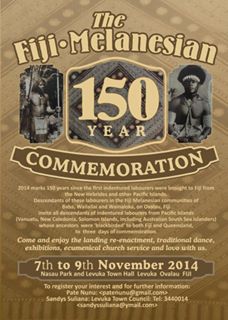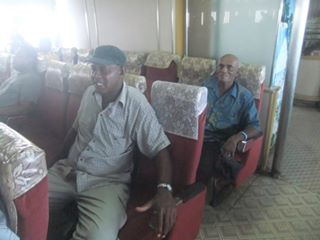"YOU need to know your identity because it identifies your culture, tradition and lineage."
These were the words of Josateki Gunaivalu, a descendant of Solomon islanders.
Last week, a team from this newspaper caught up with Mr Gunaivalu in a bid to hear more on how Solomon islanders settled in Fiji, how their ancestors arrived on our shores, their attempts to link their lineage with family members back in their island home and the fight to have their input in Fiji's economic development recognised.
With others from Vanuatu, his ancestors arrived in Fiji during the blackbirding era.
Mr Gunaivalu's grandfather, Aliki Raromai, was one of the many Solomon Islanders who were tricked and forced to travel to Fiji in the 1800s to work on cotton plantations owned by Englishmen.
He said his grandfather was one of the first settlers in a community now called Marata located in Wailoku, on the outskirts of Suva City.
He said his father, Tomasi Mawi, was born and bred in Marata and, like many other families who were originally from the Solomon Islands, had called Marata home after occupying the land for centuries.
In total, there are now five villages in the area which are occupied by descendants of Solomon islanders who came to Fiji between 1842 and 1904 when blackbirding was rife.
Two years after blackbirding stopped, Mr Gunaivalu's ancestors moved to Wailoku to establish their homes at Marata in 1906.
He said there were only three families who initially occupied Marata Village in 1906.
Over the years people started moving to the area and now there are 75 households that have set up homes in the area.
Solomon Islands' descendants started setting up homes in Marata and neighbouring villages of Wai, Vataleka, Koio and Waitebala in 1992 after Hurricane Kina displaced them from places they were residing in around the Suva area.
The names of some villages in Wailoku are similar to those in the Solomon Islands.
"From the stories I heard from my father, my ancestors arrived in Fiji and were tasked to work in a cotton plantation owned by a European man located here in Wailoku, few kilometres away from where Marata is," said Mr Gunaivalu.
"Not long after they moved here, my forefathers then started work by constructing roads and railways across the country."
Mr Gunaivalu said the construction of railways around the country was done after many cotton plantations closed down.
He said history had it that after the closure of cotton plantations, Fiji's first Governor-General Sir Arthur Gordon was the main man behind the introduction of sugarcane farms, which later became Fiji's economic backbone.
He said because the British had also ruled India between 1858 and 1947, it was from India that Sir Arthur adopted the idea to also plant sugarcane in Fiji, which later resulted in the introduction of indentured labourers to Fiji in 1879.
"Because Indians had arrived and worked in sugarcane farms, the Solomon Islanders were shifted to work in urban developments which included construction of roads and railways," he said.
"What many people don't know is that Solomon Islanders arrived first in Fiji, then the indentured labourers came from India.
"We had set the groundwork in the farm and roads. My forefathers had already cleared acres and acres of land for cotton cultivation and when cotton prices dropped, these farms were converted to sugarcane farms."
Mr Gunaivalu said many Solomon Islands communities were set up close to places where there were railways, which still exist today, because they were stationed in that area for many years, constructing railways with only the aid of pinch bars, crowbars, hammers and other light carpentry tools.
He said there was no heavy machinery at that time and his forefathers provided cheap labour in areas of urban development.
He said as far as he could remember, there were Solomon islanders who had set up homes in Navutu, Lautoka and Soasoa in Labasa, just close to railway tracks.
"From stories passed down by our forefathers, it was the Tui Vuda (at that time) who gave Navutu its name, seeing the hardships faced by the Solomon islanders as they worked in constructing railways, shedding blood and tears," he said. "Some of my ancestors died and were buried along the railway tracks."
In Nadroga, Mr Gunaivalu said some Solomon islanders also settled at Vunavutu, because they were tasked to construct railways in Sigatoka.
He said Navutu in Lautoka and Vunavutu in Nadroga had the same meaning which if translated in iTaukei Na-vutu — means pain and Vu-na-vutu — means origin of pain.
He said in Tavua, there were Solomon islanders who had settled in a place called Waikatakata, but now the place no longer exists, because many of their descendants had moved away from the area.
Marata alone has four clans, namely Areare, Waisisi, Laloisu and Korokorewa.
Mr Gunaivalu said if he was to trace his family lineage back to his village in Malaita in the Solomon Islands, he hailed from the family of Pita Keni Lorea.
"It is important to know your identity, to know your roots and it is really sad that our future generations may or may not know of how our forefathers came to settle in Fiji.
"Your identity helps a person reaffirm their sole existence here on earth. It is important, very important to know your history."
He said most Solomon Islands descendants had fully adopted the iTaukei culture and tradition and did not practise the Solomon Islands traditions and culture.
"It is saddening knowing that we do not know our language and our culture. Our forefathers came to Fiji with only the clothes they had on. They did not have money and were slaves to their masters," he said.
"They were here as slaves and did not document their lives. It is now up to us, this generation, to document our history and to educate our children and our grandchildren of our roots and our stories."
The descendants of people brought to Fiji from some neighbouring Pacific Island countries during the blackbirding era live in different parts of Fiji, including the foot of the Nakauvadra mountain range in Rakiraki.
Some descendants of Solomon islanders who lived in Navutu moved to Drasa in Lautoka a few years ago and there are others at Nadrala, Sigatoka; Caubati in Nasinu, in Navua and also on Vanua Levu.
The descendants of the victims of blackbirding are a close-knit community in the country now, with the Fiji Melanesian Council being their voice
 + Enlarge this image
+ Enlarge this image + Enlarge this image
+ Enlarge this image




































































































































































